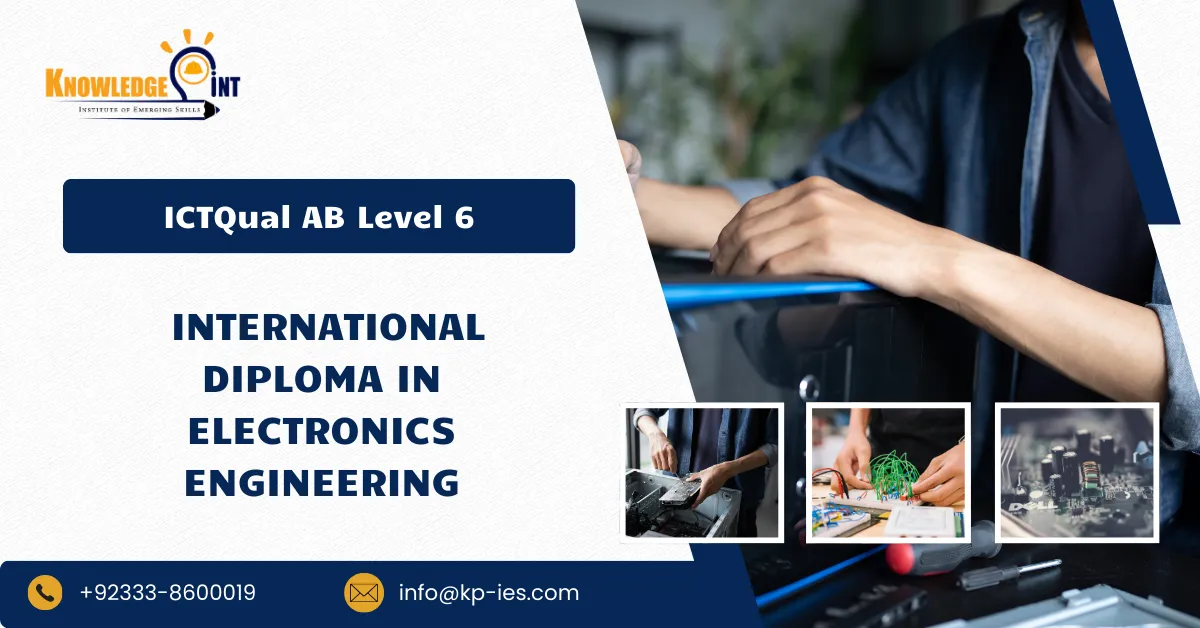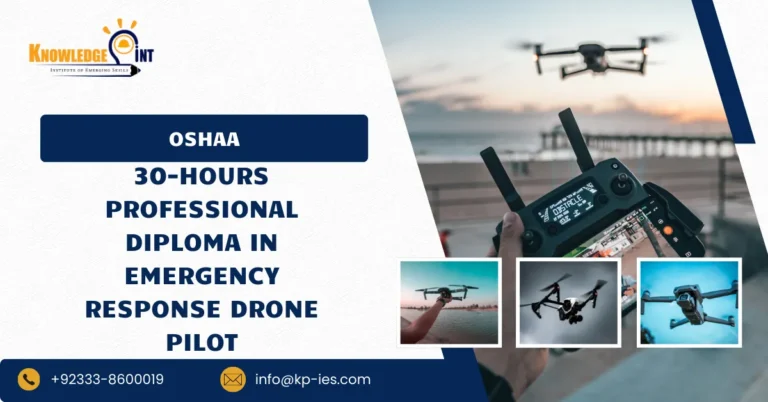The ICTQual AB Level 6 International Diploma in Electronics Engineering is a comprehensive three-year, 360-credit programme designed to equip learners with advanced technical knowledge, practical expertise, and strategic skills in electronics engineering and related technologies. This internationally recognised qualification is suitable for both freshers seeking to enter the electronics and engineering sector and professionals aiming to enhance their technical competence, design skills, and problem-solving capabilities.
Learners will explore a broad spectrum of topics, including circuit design, digital and analogue electronics, microcontrollers, embedded systems, communication technologies, power electronics, and instrumentation. The curriculum integrates theoretical instruction with hands-on laboratory work, simulation-based exercises, and project-based learning, ensuring learners develop the skills required to design, implement, and maintain complex electronic systems.
This programme offers substantial professional value by preparing learners for critical roles in electronics design, systems engineering, instrumentation, robotics, telecommunications, and embedded technology development. With global demand for skilled electronics engineers rising, learners gain a qualification that enhances employability, supports career progression, and enables them to contribute effectively to innovative engineering projects.
Key benefits of the course include developing expertise in circuit analysis, electronic system troubleshooting, embedded system programming, signal processing, and automation technologies, while also mastering professional project management and technical communication skills. The learner-focused design allows individuals to balance theoretical learning, practical work, and applied projects while gaining experience with industry-standard tools and methodologies.
Course Overview
This qualification, the ICTQual AB Level 6 International Diploma in Electronics Engineering, consists of 36 mandatory units.
Year 1 – Foundation in Electronics Engineering
- Principles of Electrical and Electronics Engineering
- Introduction to Circuit Theory
- Digital and Analogue Electronics Fundamentals
- Electronic Components and Devices
- Fundamentals of Signal Processing
- Introduction to Microcontrollers and Embedded Systems
- Health, Safety, and Environmental Awareness
- Electrical Measurement and Instrumentation
- Laboratory Techniques in Electronics
- Technical Report Writing
- Introduction to Simulation and Design Software
- Basics of Power Electronics
Year 2 – Intermediate Electronics Engineering
- Advanced Circuit Design and Analysis
- Embedded System Programming
- Communication Systems Fundamentals
- Sensors, Transducers, and Instrumentation
- Power Electronics and Motor Control
- Microprocessor Architecture and Applications
- Process Control and Automation in Electronics
- Data Acquisition and Signal Conditioning
- Project Planning and Technical Communication
- Quality Control and Assurance in Electronics Systems
- Advanced Laboratory Techniques
- Electronics Standards, Safety, and Compliance
Year 3 – Advanced Electronics Engineering
- Advanced Embedded Systems and IoT Applications
- Robotics and Automation Systems
- Advanced Signal Processing Techniques
- Wireless and Telecommunication Systems
- Electronic System Design and Optimisation
- Power Systems and Renewable Integration
- Risk Assessment and Safety in Electronics Projects
- Advanced Laboratory Experiments and Testing
- Supply Chain and Logistics in Electronics Industry
- Capstone Project in Electronics Engineering
- Professional Development and Leadership in Engineering
- Strategic Decision-Making in Electronics Projects
Learning Outcomes – ICTQual AB Level 6 International Diploma in Electronics Engineering
Learning Outcomes for the ICTQual AB Level 6 International Diploma in Electronics Engineering:
Year 1 – Foundation in Electronics Engineering
Principles of Electrical and Electronics Engineering
- Understand the fundamentals of electrical and electronics engineering principles.
- Analyse electrical circuits, systems, and components.
- Apply theoretical knowledge to basic practical applications.
Introduction to Circuit Theory
- Comprehend series and parallel circuits, Ohm’s Law, and Kirchhoff’s Laws.
- Analyse and calculate circuit parameters such as voltage, current, and resistance.
- Apply circuit theory to real-world electronics problems.
Digital and Analogue Electronics Fundamentals
- Understand digital logic, binary systems, and analogue signal principles.
- Analyse the behaviour of digital and analogue circuits.
- Apply foundational concepts to design simple electronic circuits.
Electronic Components and Devices
- Identify and describe the function of resistors, capacitors, diodes, and transistors.
- Understand semiconductor device operation.
- Apply components effectively in circuit design.
Fundamentals of Signal Processing
- Learn basic signal types and processing techniques.
- Analyse time and frequency domain characteristics.
- Apply filtering and modulation principles to signals.
Introduction to Microcontrollers and Embedded Systems
- Understand microcontroller architecture and functionality.
- Program simple embedded systems.
- Implement basic interfacing and control applications.
Health, Safety, and Environmental Awareness
- Identify potential hazards in electronics labs and projects.
- Implement safety protocols and risk mitigation strategies.
- Promote environmentally responsible practices in electronics operations.
Electrical Measurement and Instrumentation
- Use measurement tools such as multimeters, oscilloscopes, and sensors.
- Analyse and interpret electrical data.
- Apply instrumentation techniques in practical experiments.
Laboratory Techniques in Electronics
- Conduct experiments to validate theoretical concepts.
- Collect and analyse experimental data for reporting.
- Develop problem-solving skills through practical applications.
Technical Report Writing
- Produce professional reports documenting experiments and projects.
- Present data, analysis, and conclusions clearly.
- Apply proper formatting, referencing, and technical writing conventions.
Introduction to Simulation and Design Software
- Gain basic proficiency in electronic simulation and design tools.
- Model circuits and systems to predict performance.
- Use software to support problem-solving and project development.
Basics of Power Electronics
- Understand the principles of power conversion and control.
- Analyse basic power electronic circuits such as rectifiers and inverters.
- Apply concepts to small-scale applications.
Year 2 – Intermediate Electronics Engineering
Advanced Circuit Design and Analysis
- Design and analyse complex analogue and digital circuits.
- Apply design methodologies to meet functional specifications.
- Evaluate circuit performance and reliability.
Embedded System Programming
- Program advanced microcontrollers and embedded platforms.
- Implement real-time control applications.
- Develop solutions for automation and IoT systems.
Communication Systems Fundamentals
- Understand principles of wired and wireless communication.
- Analyse modulation, transmission, and reception techniques.
- Apply concepts to basic communication system design.
Sensors, Transducers, and Instrumentation
- Understand types and applications of sensors and transducers.
- Implement instrumentation systems for monitoring and control.
- Analyse data from measurement devices for decision-making.
Power Electronics and Motor Control
- Analyse power electronic devices and circuits.
- Apply motor control techniques in practical applications.
- Optimise energy efficiency in motor-driven systems.
Microprocessor Architecture and Applications
- Understand microprocessor operation and architecture.
- Implement software to control microprocessor-based systems.
- Design small-scale projects integrating microprocessor functions.
Process Control and Automation in Electronics
- Apply control theory to electronics and automation systems.
- Implement feedback and control mechanisms.
- Analyse system stability and performance.
Data Acquisition and Signal Conditioning
- Use sensors and devices for data collection.
- Implement signal conditioning techniques to improve data quality.
- Analyse and interpret collected data for practical applications.
Project Planning and Technical Communication
- Develop skills for planning and managing electronics projects.
- Communicate technical information effectively.
- Apply project management techniques to ensure successful outcomes.
Quality Control and Assurance in Electronics Systems
- Implement quality assurance practices in electronics design and production.
- Monitor compliance with technical and safety standards.
- Conduct inspections and testing for system reliability.
Advanced Laboratory Techniques
- Perform more complex experiments in electronics and instrumentation.
- Collect, analyse, and interpret experimental data.
- Apply laboratory results to improve design and operations.
Electronics Standards, Safety, and Compliance
- Understand industry standards and regulatory requirements.
- Ensure electronic systems comply with safety and performance standards.
- Implement best practices for safe and compliant operations.
Year 3 – Advanced Electronics Engineering
Advanced Embedded Systems and IoT Applications
- Design and implement complex embedded systems for IoT applications.
- Integrate sensors, actuators, and communication modules.
- Analyse system performance and reliability.
Robotics and Automation Systems
- Understand robotic systems design and automation principles.
- Implement control algorithms for robotic applications.
- Apply electronics engineering skills to automation projects.
Advanced Signal Processing Techniques
- Analyse and process complex analogue and digital signals.
- Apply filtering, modulation, and coding techniques.
- Implement signal processing solutions for real-world applications.
Wireless and Telecommunication Systems
- Understand wireless communication principles and protocols.
- Design and analyse telecommunication systems.
- Apply RF, microwave, and networking concepts in projects.
Electronic System Design and Optimisation
- Develop complete electronic systems from concept to implementation.
- Optimise design for performance, efficiency, and cost.
- Conduct system testing and troubleshooting.
Power Systems and Renewable Integration
- Analyse electrical power systems and renewable energy integration.
- Implement strategies for energy efficiency and sustainability.
- Optimise system performance and reliability.
Risk Assessment and Safety in Electronics Projects
- Identify risks in complex electronics projects.
- Implement mitigation strategies to ensure safety and compliance.
- Monitor projects to maintain high safety standards.
Advanced Laboratory Experiments and Testing
- Conduct advanced experiments to validate complex systems.
- Analyse results for design optimisation.
- Apply experimental findings to operational solutions.
Supply Chain and Logistics in Electronics Industry
- Understand procurement, production, and distribution in electronics manufacturing.
- Optimise supply chain efficiency and reliability.
- Integrate logistics planning with project and system management.
Capstone Project in Electronics Engineering
- Undertake a comprehensive project integrating knowledge from all units.
- Solve real-world electronics engineering challenges.
- Present findings, recommendations, and solutions professionally.
Professional Development and Leadership in Engineering
- Develop leadership, teamwork, and strategic decision-making skills.
- Enhance professional communication and project oversight capabilities.
- Prepare for senior operational, managerial, or consultancy roles.
Strategic Decision-Making in Electronics Projects
- Apply analytical frameworks for informed engineering decisions.
- Consider technical, financial, and operational factors in strategy.
- Implement long-term initiatives for sustainable and efficient electronics systems.
Course Benefits of ICTQual AB Level 6 International Diploma in Electronics Engineering
- Provides in-depth knowledge of electronic circuits, systems, and devices.
- Equips learners with practical skills in designing, testing, and troubleshooting electronic systems.
- Enhances understanding of digital electronics, microcontrollers, embedded systems, and communication technologies.
- Develops expertise in signal processing, control systems, and automation.
- Offers hands-on experience with laboratory experiments, simulation software, and real-world electronic projects.
- Strengthens problem-solving, analytical, and technical decision-making skills.
- Prepares learners for leadership and project management roles in electronics and technology projects.
- Improves employability in electronics design, manufacturing, and R&D industries.
- Provides awareness of safety standards, industry regulations, and quality control in electronics engineering.
- Supports professional development and continuous learning in emerging electronics technologies.
After completing this course, learners can progress in the following ways:
- Pursue Master’s degrees in Electronics Engineering, Embedded Systems, Robotics, or Telecommunications.
- Obtain professional certifications such as Certified Electronics Engineer, PCB Design Specialist, or Industrial Automation Professional.
- Advance into technical and managerial roles such as Electronics Engineer, Control Systems Engineer, Embedded Systems Developer, R&D Engineer, or Project Manager.
- Work with electronics manufacturing companies, research laboratories, telecommunications firms, and automation industries.
- Progress into leadership positions, managing teams and projects in electronics and technology sectors.
- Engage in research and innovation in areas like IoT, robotics, embedded systems, and smart electronics.
- Transition into consulting, technical advisory, or academic roles in electronics engineering and technology education.







